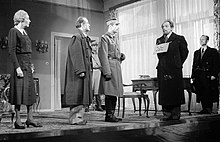Professor Mamlock (acting)
Professor Mamlock is a play that is considered the most successful work of the doctor and writer Friedrich Wolf . He wrote it in 1933 shortly after the National Socialists came to power in exile in France . The drama is divided into four acts . The main character is the Jewish doctor Professor Hans Mamlock, who runs a surgical clinic. He is a staunch Democrat and Hindenburg voter , who, however, finally breaks down and commits suicide because of the increasing reprisals against the Jews.
The play had its world premiere on January 19, 1934 in the Jewish theater "Kaminski" Warsaw , where it was performed in Yiddish under the title "The Yellow Spot". It was first filmed in the Soviet Union in 1938. The German premiere of the play took place on December 8, 1934 in the Zurich Schauspielhaus under the title "Professor Mannheim". In 1961 DEFA filmed the play again.
action
- Act One - before the May 1932 election, on Professor Mamlock's ward
The doctors and nursing staff in the clinic are talking about the political situation in Germany. Two of the doctors, Dr. Hellpach and Dr. Inge Ruoff, hope that Adolf Hitler will come to power. Dr. Hirsch speaks against it, as does the editor-in-chief of the "Neue Tagblatt", Dr. Seidel, who is present as a patient. Everyone else is reluctant. Professor Mamlock forbids political discussions in his clinic.
- Act Two - February 28, 1933, immediately after the Reichstag fire, in the Mamlock family's living room
Ellen, Professor Mamlock's wife, talks to her son Rolf and her daughter Ruth. Rolf reads from the daily newspaper about the Reichstag fire . He accuses the National Socialists of arson. The mother is worried and asks Rolf to stay away from politics. The father is outraged by Rolf's accusations, because he sees the state defamed by them. Rolf, the only one in the family who realizes the seriousness of the situation and distributes forbidden newspapers underground, is faced with the decision between work and family by his father. He leaves the apartment.

A short time later, the Jewish nurse Simon announced that SA troops had occupied the clinic and were looking for “non-Aryan” doctors. All communists, pacifists, internationalists and Jews are banned from working in the clinic. Dr. Ruoff announces that she will no longer work under the Jew Mamlock. Dr. Hellpach leaves the clinic and becomes an SS man .
- Third act - April 1933, in the Mamlock family's living room
Professor Mamlock is no longer allowed to enter his clinic. In his place, Dr. Hellpach the line. Ruth is abused at school and humiliated by graffiti on her clothes. Mamlock is now trying to get to the clinic despite the ban. He fell into the hands of a group of SA men who tore his clothes and hung a sign with the words “Jew” around his neck. He returns home a broken man.
- Fourth act - The following day in the clinic
Due to a new regulation, Professor Mamlock is allowed to work again in the clinic as a meritorious war veteran. He is now hoping for justice again. Dr. Hellpach points out to all employees that all "non-Aryans" to whom the war participant clause does not apply must be dismissed immediately. Professor Mamlock shows his solidarity with the nurse Simon and realizes that his hope for justice was in vain. He protests briefly, whereupon some of his old friends turn away from him. After seeing no other way out, he shoots himself with his old pistol from the First World War .
Film adaptations
The first film adaptation of the play was made in 1938 in the Soviet Union under the direction of Adolf Minkin and Herbert Rappaport . This version was shown for the first time in Germany on November 24, 1947. In the USA, the film was viewed by some local authorities as anti-German propaganda and accordingly was partially not shown.
On July 11, 1961, the DEFA film adaptation of Professor Mamlock was released in the GDR cinemas . It was directed by Friedrich Wolf's son Konrad , who in addition to Karl Georg Egel co-wrote the screenplay. The film was with Wolfgang Heinz (Professor Mamlock), Ursula Burg (Ellen Mamlock), Hilmar Thate (Rolf Mamlock), Doris Abeßer (Ruth Mamlock), Peter Sturm (Dr. Hirsch), Harald Halgardt (Dr. Hellpach), Lissy Tempelhof (Dr. Inge Ruoff), Agnes Kraus (sister Doris) and Ulrich Thein (worker Ernst) exceptionally well-known actors from DEFA. Manfred Krug played an SA storm leader in a supporting role.
The film is considered to be one of the first German films to deal with the persecution of the Jews by the National Socialists. In contrast to the Soviet film, in which the social dimension is in the foreground, the DEFA film emphasizes the individual fate of Professor Mamlock more. The film was awarded a gold medal at the Moscow International Film Festival and the Silver Lotus Blossom at the New Delhi International Film Festival .
literature
- Friedrich Wolf: Professor Mamlock / Cyankali. Structure of the Taschenbuch Verlag, Berlin 2004, ISBN 3-7466-2053-8 .
Web links
- Professor Mamlock. play
- film.at - Professor Mamlock Information on the DEFA film


